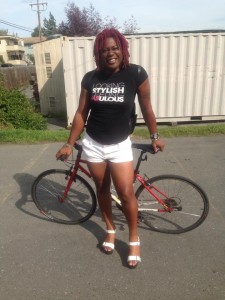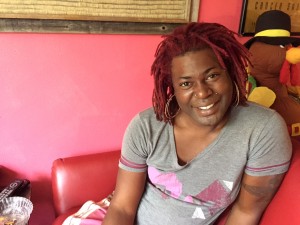
Reports show that violence against transgender people is rising nationwide. But one Anchorage woman is trying to fight transphobia locally by raising awareness that they’re part of the community, too. Her plan involves a bike, flashy pink nails, and an achingly long ride.
MoHagani Magnetek sits on a red leather couch sipping a goblet of carrot juice next to a bookshelf overflowing with tombs on anthropology, gender, and history with some novels thrown in. She lights up a cigarette and reflects on her current look.
“People are like ‘Oh my goodness, you look so good, you look so good.'” she gushes. “And don’t ever dawn on me, I’m thinking maybe it’s the make up or this or that. But I need to start telling people the truth: it’s carrot juice. Because you know the carrot juice will turn your skin orange and it makes you glow more, you know?”
She also glows with confidence in her new body. “It’s been great! My little boobs are coming along. I’m so proud of myself. My skin is softer. I have less facial and body hair to deal with.”
Two years ago Magnetek started taking hormones and transitioning physically into the woman she’s always been inside. And now, she’s making herself visible — biking around Anchorage in outer space patterned leggings, bright red locks poking out from underneath her Go Pro-equipped helmet. This Sunday, she’ll loop through town for 100 miles–her first century. She wants others to ride with her.
“There’s nothing official about it. There’s not checkpoints or anything like that. No bells and whistles and balloons. There’s no numbers on my chest. Just me and my dusty t-shirt on my bike, riding around Anchorage.”
But she hopes people will take notice. She wants Anchorage residents to remember that transpeople are part of the community, too, because she says sometimes people forget.
“I go through some very terrible things,” she says. “I’m always mis-gendered and people pointing fingers at me or saying nasty things about it. And it hurts. It hurts me to the core.”
Magnetek says she knew she was a girl from early childhood, but she spent years covering it up and trying to be hyper masculine in public. She played football and joined the Coast Guard. But when she was 36, she was struggling with her bipolar disorder and PTSD and she attempted suicide.
She recalls waking up in the psych ward and thinking, “I need to, like, really, really tap into my emotional being and what that is and what that’s about.”
She left the Coast Guard, moved to Anchorage – where she had graduated high school – and after a few months, lived alone for the first time…
“And I just totally girl-ed out! Lipstick, make up, did my toes, and had a good time. And I woke up the next day and thought, ‘Oh my gosh, Mo, what are you doing?'”
She embraced it. She started seeing a doctor and a therapist, got on hormones, and joined a support group for transgender veterans. According to the ACLU, one-fifth of all transgender adults are veterans. Last year Magnetek legally changed her gender. This year she changed her name.
“It’s past tense,” she says of her former names and identities. “That was a nice guy. He really was. He lived to be 36, but he had to go eventually. Let it go. Let the whole persona and facade go.”

One study says about 700,000 people nationwide identify as transgender — that’s nearly the whole population of Alaska — but it’s hard to get exact numbers because people are not always open about it.
Magnetek says for the most part, her transition has been easy – her family and most of her friends accepted it. But that doesn’t mean society has. In 2013 she had a very public row with Humpy’s Bar in downtown Anchorage when they prevented her from using the women’s restroom.
She says the bathroom issue is the most obvious problem for transgender people—do they use the one for their biological sex or their actual gender? Magnetek says you have to stand up for yourself.
“You can’t rely on other people to do it for you. You have to do it yourself because no one is going to care about your right to use the bathroom but you. Especially when you gotta pee!”
To deal with the stress and her mental illnesses, she started biking. She’d go out for 30 or 40 miles, just thinking about the issues facing transpeople. And then she got the idea for the “We Are Human, Too” Century Ride to raise awareness of transphobia in the community.
“You know I want to do something for other people. I want to have more meaning or cause behind what I’m doing other than me just riding my bike for my health. It’s larger than me.”
She plans to bike with a camera and chat with people along the way about being a transgender person and the stigmas of mental illness. She’s also raising money for the National Alliance on Mental Illnesses.
You can listen to a longer version of the interview and hear more about Magnetek’s transition and life as a transgender woman here.
Anne Hillman is the healthy communities editor at Alaska Public Media and a host of Hometown, Alaska. Reach her atahillman@alaskapublic.org. Read more about Annehere.





